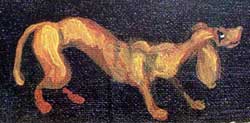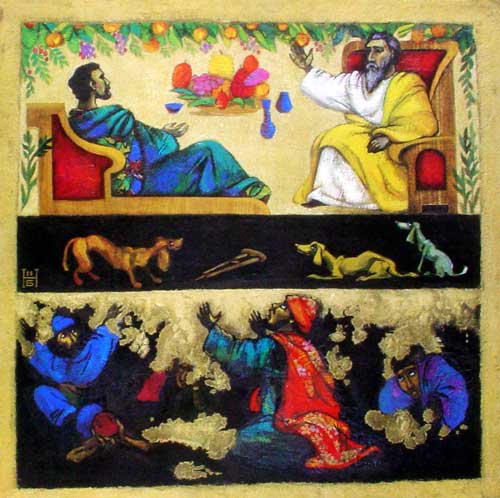


"The Rich Man and Lazarus" by Kazakhstan Artist Nelly Bube.



Marshall: It has been argued that either the parable, Luke 16:19-31, has influenced the form of the miracle story, John 11, or vice versa.
That is a redaction-critical observation: John rewrote Luke or vice versa or they had a common source. Scripture indicates no connection whatever between the two accounts. Our pericope is a parable but the account in John is true history. It has been argued that Luke 16:19-31 might also be true history, but that it is parabolic in nature is clear. Note how similar the working in verse 19 to the wording in verse 1, another parable.
Furthermore, as Arndt points out, Jesus is still in Perea. John 11 took place later at Bethany.
Luke 16 is a unit. Verses 1-13 speak of the proper use of money or Mammon. Verses 14-18 show the Pharisees' displeasure and Jesus' answer to them. Verses 19-31 speak of the improper use of money due to lack of hearing the Word of God.
Verses 14-18 ought be studied briefly before studying 19-31. The money-loving Pharisees scorned Jesus' words in verses 1-13. In no uncertain terms Jesus told them that they were self-righteous and that what they valued highly was an abomination before God. The Old Testament extended until John the Baptist. At his preaching of the Gospel people pressed into the Kingdom of God. But that in no way invalidated the Law of God, which the Pharisees disregarded. Jesus gives an example in verse 18. The Pharisees were permissive toward divorce. It was an indication of their impenitence. Now comes our text which is spoken primarily to the Pharisees. Their real problem was disregard for Moses and the prophets, verses 29-31.
This should be read "A certain man was rich." His name is not mentioned. Tradition calls him "Dives," which in Latin means "rich man."
"Purple and fine linen" denote the outer and inner garments of the wealthy. Look at Esther 1:6 and Revelation 18:12. The man was a hedonist and voluptuary. Daily he lived a life of pure pleasure. The text indicates something like our modern "playboy."
"Beggar" or "poor man," both are correct translations. That the beggar is given a name reminds one immediately of Luke 10:20. And, in keeping with this, note that the rich man is not named. The commentaries point out that Lazarus means "he whom God helps."
By the way, this is the sole instance of a name given to someone in Jesus' parables.
"He had been placed and still lay, etc." He was at the gate of the mansion. He was covered with ulcers. Thus far we are told that he had been abandoned by other human beings, was very ill, and evidently could not walk.
"Furthermore." We are reminded of the Prodigal Son in Luke 15:16. In neither case are we told that the desire was fulfilled. He desired to be fed by the food which constantly fell from the table onto the floor. The dogs were evidently ownerless, scavenger dogs. They constantly approached the sick man. The ulcers would not heal. Do the dogs picture aggravation or alleviation of this man's misery? Commentators argue about this. It is best to avoid this problem by simply saying that it denotes is wretchedness, misery, and abject condition. We can't be sure as to whether the dogs improved his condition or made it worse. His sole associates were scavenger dogs.
"It happened." The only thing that the two men had in common was death. This sentence reminds us of Hebrews 1:14. The bosom of Abraham means paradise as in Luke 23:43. Those who claim that there are more than two places after death deny this. "The bosom of Abraham" is figurative for close association with the father of believers.
The thought continues, "and what's more." Though both died, only the rich man was buried. This evidently means a magnificent burial in keeping with the rich man's wealth.
"In hell." Much has been written about this expression. Some translate "in Hades." In Greek it literally means "the unseen" meaning simply the state after life. In the LXX it translates Scheol, the state after death, which must be translated in context. In the New Testament "hades" always means "hell" and should be so translated. There are only two places: Paradise and hell. The Scriptures in no way teach that there is a third place.
Verses 23-28 are picture language. Space and time do not exist in the hereafter. The hereafter is incomprehensible to us. Therefore, Jesus uses picture language. Jesus is not saying that the bodies of the two men were taken to the hereafter.
The last part of the sentence is not meant to teach that the damned can see or are conscious of the redeemed in Paradise. It is introduced here merely to make the point of the parable at the end.
"He cried out," denoting his pain. He prays but it is too late. He uses "father" in the same sense that Jesus' enemies did in John 8:39, denoting only physical descent, not the faith relationship. That is clear from what follows.
His idea of mercy is not that of the mercy of the Gospel, the forgiveness of sins, but only of material things. By the way, he still considers Lazarus his subordinate.
The flame of the fire caused his agony.
"Son," or "my son," or "child." Why would Abraham call him this? He was not a child of God. Perhaps it indicates that God, not Abraham, is the rich man's judge.
Furthermore, what follows indicates the rich man's ignorance, even in hell. He had not yet learned. Abraham needs to remind him. "Recall, you received in full." This verb reminds one of Matthew 6:2 and 5: "They have their reward in full (in this life.)" But there is stops.
"Remember, the things which you considered good, which were not yours, and were not given to God." Both men receive, but what they received was totally different. "Misery" was God's gift to Lazarus. Lazarus did not cause the misery. God permitted it to come to him and Lazarus endured it.
"But now here" introduces a complete reversal. Note the chiasmus in this verse. The rich man's earthly pleasures and eternal pain are mentioned first and last. Lazarus' misery and comfort are mentioned in second and third position.
"Furthermore, in addition to all of this." This verse simply denotes the utter finality of the judgment.
"Chasm" is used only here in the New Testament. It has "lastingly been fixed."
Note his desperation, something like "well then." "I beg you." His request denotes his ignorance and desperation. Again he still considers Lazarus his subordinate.
"For" means "you see." The number five is not symbolical but a mere round number.
The emphatic point is made. It explains itself. Jesus was speaking to the self-righteous, avaricious, adulterous Pharisees who were not listening to Moses and the Prophets, the Old Testament which was not making them wise until salvation simply because they were not listening.
"No" is emphatic. "That is not enough." In the judgment of the rich man, Abraham does not know what he is talking about. It indicates ignorance and arrogance. "On the contrary." Now follows a future more vivid condition. The rich man is sure that the message of a resurrected person will cause repentance.
But it is not so. Look at John 11:45-54. The raising of the historical Lazarus only deepened the enmity of unbelievers. After His resurrection, Jesus showed Himself to no unbelievers. Only the Word, on Pentecost, could convert.
Verse 31 contains a double protasis, one of a fact condition, the other a future more vivid. "If they aren't listening to Moses and the prophets, they won't be persuaded, not even if someone should rise from the dead."
It is remarkable that Abraham says "convinced" and not "repent." The latter is stronger than the former. Repentance is much more than persuasion. Lenski observes that Abraham means that they won't be persuaded that someone has risen from the dead, like Jesus' enemies in John 11, much less that they would repent.
The whole parable is a warning to Jesus' hearers that they listen to the Word of God which alone can cause a person to repent, the key to entrance into the Kingdom of God.
That Lazarus is pictured as a believer and that the rich man was a selfish unbeliever is implicit in this pericope. Read the beatitudes in Luke 6:20-23 and then the "woes" in verses 24:26, a remarkable parallel to this text.
The silence of Lazarus in this parable is remarkable. By the grace of God the believer quietly endures his crosses in this life. And in the life to come he will need no defense because he will be in Abraham's bosom.
This parable is the last in a remarkable sequence of parables in Luke:
14:7-24, Jesus speaks three parables to host and fellow-guests to bring them to repentance;
14:25-35, Jesus speaks to the crowds about the necessity of having the proper resources for Christian living;
15:1-32, the three parables picturing repentance and conversion;
16:1-13, Jesus addresses His disciples on the proper use of Mammon;
16:19-31, a parable warning the Pharisees who impenitently disregarded the true message of Moses and the prophets.
Verses 27-28 can hardly mean that the rich man has finally come to love his brothers. Eternal punishment does not convert the damned. Some commentators think that the rich man wants Lazarus to go to his brothers because he fears them, that they will torment him in hell because their are like him. But the text in no way indicates this. The sole purpose of verses 27-31 is simply that a person must hear the Word of God so that the person might live in constant repentance, before it is too late.
It hardly needs to be said that this parable does not teach that riches and wealth per se are evil and lead the individual to hell. It is the love of money, not money itself, which is evil. Nor does this parable say that poverty, misery, and woe per se lead to everlasting life. Luke 6:20 draws a comparison between the repentant, suffering believer and the arrogant, selfish, impenitent unbeliever.